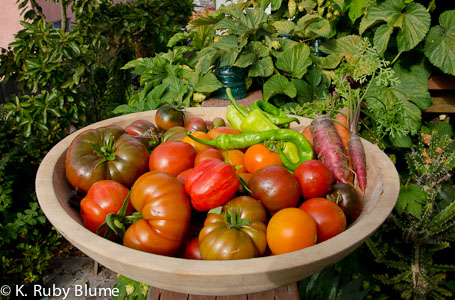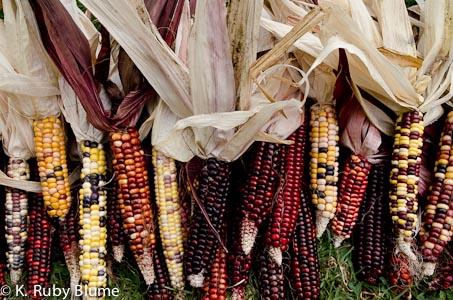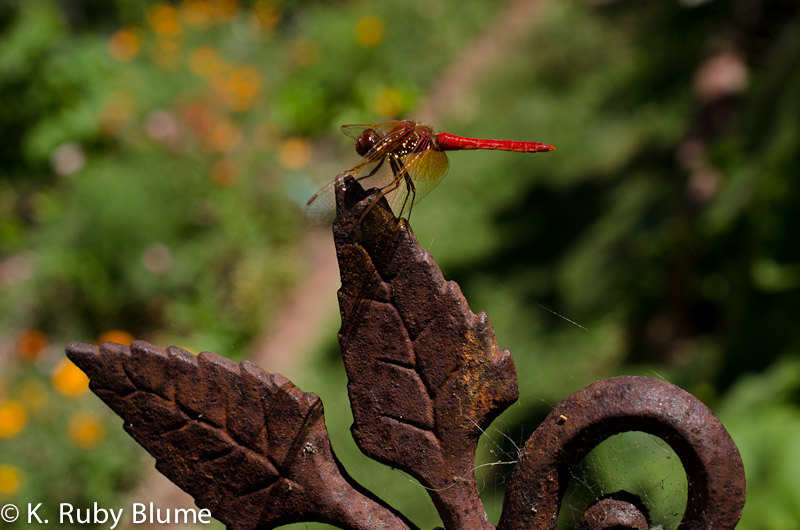Institute of Urban Homesteading
Newsletter
September 2012
Hi Everyone!
Welcome back from your end of summer festivities and travels. It is "back to school" time and I am excited to share the fabulous line-up of classes we have planned for the fall. If you have not gotten in on our core curriculum like Cheesemaking 101, Canning, Backyard Chickens and Natural Beekeeping it is not too late for 2012! Plus we are offering two different styles of Fall foraging (gleaning and wild foraging), a soap-making Intensive, Urban Orchard Care & Pruning, Fermentation Intensive, Natural Building, Introduction to Natural Wool Felting, Local medicine making, DIY Home Facial Spa and much more. Pleas check out the full Fall schedule below and join us in the abundance of the season!
 |
 |
Notes from the Garden: In the Harvest Flow
While my lemon cukes, onions and beans did not thrive this season and the tomatillos completely succumbed to powdery mildew (anyone else have this problem?), other crops are coming on hard and fast, so that it is diffcult to keep up with eating! The tomatoes are flowing in a glut of salsa, caprese salad and sauce. I am "in the black" with Black Krims, Black plums, Jaune Flamme and endless handfuls of the tiny "wild sweetie" cherry tomatoes. The "determinate" varietes I planted seem to be just as overflowing with the likes of Rosella Purple,Tasmanian Chocolate and Beryl Beauty. I somehow managed to time things so that I also hae new crops of lettuce and endive coming on, along with cukes, carrots and peppers, so it's salad time! Hidden under slightly yellowing leaves are several dozen winter squash: Baby Butternut, Acorns and Blue Hubbards, as well as the two midget melons which are tiny, but actually sweet! Basil and zucchinis refuse to give up and the garden is awash in color with autumn flowers. Ah the glory!
Permaculture principle #6 Produce No Waste
Waste is a concept foreign to nature; everything produced gets eaten, decomposed and reused. The earthworm consumes plant "wastes" turning them into enrichened soil. Bacteria hang out on tree leaves protecting them until they fall, at which moment those same leaves become their food. In the garden we compost everything that is left over, use wood from pruning to stake plants or edge our garden beds or use egg shells as a natural snail control that then becomes available calcium for the plants. The next wave of limiting waste is to prioritize the use of natural compostable materials in other areas of our lives. Building materials such as earth, cob and wood, that can eventually return to the earth,. Clothing fibers like wool and cotton are similarly compostable. Who will be the first to produce a fully bio-degradable computer or mp3 player? That also produces no waste in it's production? Don't know where to get biodegradable products? Here is one cool website for home products: http://lifewithoutplastic.com/
Seed Saving Lesson #3: Next Hardest, Cucurbits!
In last month's seed saving lesson, I told you about some plants that you can always and easily save seed from: plants in the sunflower, nightshade and bean families. But not every plant is self-pollinating. Plants that are wind or insect pollinated will cross with members of their same family. Some plants that look differently are actually the same species and can even more readily cross, such as broccoli and cauliflower. Such plants need some sort of isolation from each other in order to ensure that the next generation resembles the current generation. One way to separate plants is by distance and different plants need different isolation distances.. The second method is by timing--only one of that species flowing at the same time within the recommended isolation distance. If distances and timing cannot separate unwanted crossing (in the city it is almost impossible to ensure no one else is growing corn in a 1 mile radius) then the plants must be mechanically contained using cages, bags or other means and then be hand pollinated or insect pollinated by introducing those insects to the cage.
Cucurbits are a wonderful and useful family of plants which includes squash, melons, gourds and cucumbers. Isolation distances are not great, but in order to save seed without hand pollination, you must make sure you have only one of each species in your yard. You can have one type of cucumber flowering at a time, one melon, one watermelon, and one each of the following
Cucurbita pepo all summer squashes (zucchini, yellow squashes, etc.), some pumpkins, pattypan, spaghetti, delicata, and acorn
Cucurbita moschata butternut squash
Cucurbita mixta cushaw, some pumpkins
Cucurbita maxima, kabocha squash, some pumpkins
If that is too hard to keep straight, hand pollination of cucurbita is not difficult and is a great place to start! Male and female plants are easily identified. The female flowers have a miniature version of the squash below the flower. Tape flowers shut with masking tape the night before they are to open (they will start to turn yellow and bulge out in the center). Tape 3 males for each female. The next morning, gently open the female, making sure no insect pollinators are around. Then rip of the petals of 3 males and swish the pollen grains onto the sticky center of the female. Tape her shut again and mark the stem so that you know this is the fruit with the pure seed. Full tutorial with pictures here.
Book Review: Top-Bar Beekeeping: Organic Practices for Honeybee Health by Les Crowder and Heather Harrell
***** Five stars! Finally we have a functional and thorough beginning bekeeping book that focuses on natural methods using the Top Bar system of beekeeping. Les Crowder is one of the premier top bar beekeepers with over 50 years experience beekeeping and 30 years with the Top Bar System. I have seen him speak and in person he is one of those people who thinks and speaks holographically..rambling poetic on tangential topics deep into the night. Fortunately the book has been tamed and organized by Les's wife. It is a thorough introduction for new beekeepers, covering all the topics you might need in your first couple seasons. One of the nicest features of the book is a series of cutaway diagrams that show how food stores, brood and honey might be organized within the hive in different seasons and how to manipulate the bars for different outcomes. There are also great sections on processing wax and rearing queens (which may be still a little beyond comprehension for beginners,,but awesome that it is included) The only down side to the book in my opinion is that in he process of making it readable and organized, little of Les' guru-like brilliance shines through. Nevertheless it is thus far, the only book on top bar beekeeping that I can recommend with enthusiasm.
(Want to know more about bees and Natural Beekeeping? Please come to our Introductory beekeeping class on September 29th, 10am-4pm)
FALL CLASSES
SEPTEMBER
Saturday September 8th
Backyard Chickens
Instructor: Jeannie McKenzie
Location: Montclair
Cost: $30-60
Fall in love with backyard chickens!
This class will introduce you to the fascinating world of backyard chickens and give you the information you need to get started with your own low-effort backyard flock.
Tuesday September 11 6:30-9pm
Weapons of Mass Destruction Awareness Training
Location: TBA
Cost: $30-60
As Americans, most of us never think about facing a dirty bomb or an anthrax outbreak. This course will give you a basic awareness of the most common ugly things out there and how to keep as safe as possible during the initial stages of a chemical, ordinance (explosive),biological or radiological emergency.
Wednesday, September 19th, 6:30-9:30pm
Cheesemaking 101
Location: North Oakland
Cost: $40-70 plus $12 supply fee to bring on the day of class
will learn about equipment, ingredients and cultures used in cheesemaking and get hands-on practice making yogurt, a fresh cheese and a feta cheese.
Saturday September 15th 10am-1pm
Urban Fruit Forager
Location: Berkeley ir Oakland TBA
Cost: $30-60
Laws regarding foraging iurban foraging etiquette, food safety, and resources followed by a walking tour highlighting the urban edible landscape, including tree fruit, edible flowers, greens, cactus, and seeds.
Sunday, September 16th, 2:00-6:00pm
Canning Extravaganza
Location: North Oakland
Cost: $50-80 plus $12 supply fee to be paid on day of class
All you need to get started canning fruit and tomatoes at home.
Sunday, September 16th, 10:00am-3:00pm
Natural Building in the Urban Fabric
Location: El Sobrante
Cost: $50-85
Natural building is an accessible and practical way to explore the creation of ecological life in the city. This course offers an hands-on introduction to the basic materials of natural building: clay soil, sand, and straw; and discusses what forms of natural building can be beneficially integrated into your home and into the urban fabric.
Saturday, September 22 10am-4pm
Felt the Sun: Introduction to Natural Fiber Felting
Location: Canyon (just over the hill from Skyline Blvd)
Cost: $50-80
In this class you will learn to make wool felt, a non-woven textile made directly from the loose fibers. Starting with raw wool from Sonoma County sheep, each participant will make a durable felt bag or hat.
Saturday, September 22nd, 2:00-5:00pm
Lather 101: Cold Process Soap: Bar and Liquid
Location: North Oakland
Cost: $35- 65 plus $10 supply fee to be paid in cash on day of class
Learn the cold process method for making soap including types of bar soaps, how to balance your fats and alkalines with solid ratios, attributes of different plant oils, and fun things to add for various benefits like exfoliation or extra moisturizing.
Sunday, September 23rd, 2:00-6:00pm
Lather 102: Hot Process Soap and Shampoo
Location: North Oakland
Cost: $40- 70 plus $10 supply fee to be paid in cash on day of class
This class will take you a step further into learning how to make artisan level hot process and castille soaps and how to blend these with herbal infusions to create shampoos tailored to your own hair type. Prerequisite : Lather 102--take them separately or all in one weekend as a mini-intensive.
Sunday, September 23rd, 10:00am-4:00pm
Urban Orchard Care & Pruning
Location: South Berkeley
Cost: $50-80
This full-day workshop will offer a comprehensive look at caring for your backyard orchard. Participants will learn basic tree identification, selection, pruning and how to diagnose and treat the most common conditions affecting orchards.
Saturday, September 29th, 10:00am-4:00pm
Natural Beekeeping with the Top Bar Hive
Location: North Oakland
Cost: $50-80
In this course you will learn about the life cycles and biology of the honey bee, basic management strategies and equipment needed to get started as a backyard beekeeper using the Kenyan Top Bar Hive, a low input natural beekeeping system. This end of season class will include hands on honey harvesting and is suited to folks who want to start a new hive the following spring.
OCTOBER
Wednesday, October 3rd, 6:30-9:30pm
Mead Making
Location: North Oakland
Cost: $35-65
In this class we will learn the basic process of making wine from honey including equipment, ingredients and fermentation techniques, tips, tricks and troubleshooting,
Thuesday, October 4th 6:30-9:30pm
DIY Local Medicine Making: Tinctures & Teas
Location: North Berkeley
Cost: $35-65 plus supply fee in cash on day of class
In this class you will learn to create 'local medicine' from native, culinary and horticultural herbs right out of the garden! We'll learn about tinctures, decoctions , infusions and salves, how to make them,how to use them and the benefits of each.
Saturday, October 6th, 10:00am-3:00pm
Fermentation Intensive (formerly "Living Cultures Kitchen")
Location: North Oakland
Cost $60-85
Come explore the transformative process of micro-organisms in the kitchen! In this class we will learn to harness the micro-scopic world to enhance flavour, nutrition and digestability, turning raw organic ingredients into foods and condiments which far surpass their commercially available counterparts. We will learn about yogurt and yogurt cheese, chevre, butter, buttermilk and whey, kefir and kvass. Then we'll move on to sauerkraut, fermented soada, kombucha and vinegar.
Sunday, October 7 1-5pm
DIY Spa Day Home Facial Care
Location: Berkeley
Cost: $40-70
We'll spend a lovely Sunday afternoon mixing together organic and natural kitchen ingredients into healthy scrubs, steams, masks, and moisturizers to noursih your face. Then you'll use the products we've created to give yourself a relaxing treatment or partner up with a new friend and practice giving a home facial.
Saturday, October 13th, 1:00-6:00pm Sunday, October 14th 10:00am-2:00pm
Cheesemaking Intensive
Location: North Oakland
Cost:$160 -200 includes supplies
This two-day intensive course will cover everything you need to get started making simple cheeses that are easily created in a home environment. We will learn about cultures, equipment, ingredients and cheesemaking concepts and will work with both cow & goat milk to complete a number of cheesemaking projects including: Yogurt, Yogurt Cheese, Feta, Ricotta, Brie, Buttermilk, Sour Cream, Chevre, Mozarella and Cultured Butter.
Wednesday October 17, 6-9:30 pm
Dehydration Basics
Location: Oakland, Fruitvale
Cost: $35-65 plus at $10 supply fee to be paid on the night of the class
Learn the ancient art of dehydration and low temperature baking.
Saturday, October 20th, 12:00-4:00pm
Rabbit Butchering and Tanning
Location:North Oakland
Cost: $40-60
Following a tour of the rabbitry and a brief discussion on the benfits of rabbits as urban livestock we will demonstratte humane slaughter and dressing. Also included will be ideas for preparation of both rabbit meat and organ meats. Then the instructor will take you through a step by step demonstration of the tanning process. Some hands on will be possible.
Sunday, October 21st, 2:00-5:00pm
Whats Wrong With my Chicken (rabbit goat duck)!?
Home Healthcare for Urban Livestock
Location: Berkeley
Cost: $75-125
All of us keeping urban livestock have, at one time or another, been faced with a sick or injured animal having no idea what to do. This class will cover prevention, diagnosis, triage and first aid for several typical urban livestock.
Sunday, October 21st, 2:00-5:00pm
Decadent & Healthy Cordials
Location: North Oakland
Cost: $35-65 plus $15 supply fee to be paid on day of worksho p
Discover the alchemist in yourself by learning the fundamentals of cordial making. Cordials are decadent deliscious potions which can also enhance health as digestives, sleep aids and immune system boosters. Cordials make great gifts, and everyone will take home one of their own.
Thursday October 25, 6:30-9:30pm
Hand Sewing Basics
Location: North Oakland
Cost: $40-60, $3 supply fee
We will learn basic stitches and processes in hand sewing for mending and for making small gifts such as camera & Ipod cases, sachest pillows and more. This class is a must for folks who want to beef-up their reuse and repair chops.
Sunday October 27, 1-4pm
Wild Foods: Fall Foraging Expedition
Location: East Bay Hills
Cost: $35-65
We'll stroll through th east Bay Hills in search of Fall;s bounty. WQith luck we'll find nuts and berries, edible bulbs or tubers. Common edible greens will be discussed and identified. We'll have a chance to taste some of these delectables and learn how to cook them.
NOVEMBER
Wednesday, November 7th, 6:30-9:00 pm
Cheesemaking 102
Location: North Oakland
Cost: $40-65
Pre-requisite: Cheesemaking 101
Continue your cheese education and learn to make mold ripened cheeses including camembert, brie, blue, gorgonzola and cambezola.
Wednesday November 14, 6:30-9:00.pm
Introduction to Machine Sewing
Location: North Oakland
Cost: $35-65 plus $10 supply fee
Learn to properly thread, sew and do basic maintenance on your machine, as well as to identify what all those extra parts do. We'll cover basting, standard and zig-zag stitching. We'll learn how to pin, iron and make a hem seam as well as other tips. And to make it fun, we'll sew a pillow case to take home. Don't forget to bring along your sewing machine (a couple are available for you to borrow, but not enough to go around.
Saturday, Novermber 17th, 10:30am-1:00pm
Olive Picking and Brining on the Ranch
Location: Hillcrest Ranch, Sunol
Cost $35-65 plus $15 supp;y fe to be paid to instructor on the day of classe
Discover the joy of making your own olives. We'll start by picking ripe olives from this historic 6 acre olive orchard. Then we'll learn home to preserve them through the traditional process of brining.
